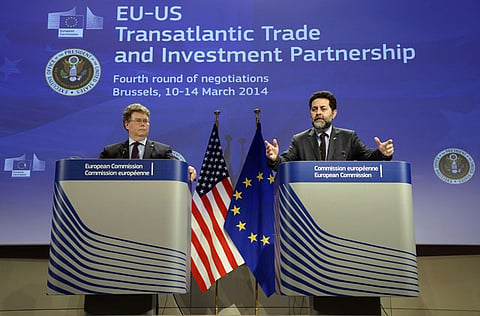Steady progress, no breakthrough in US-EU trade talks
Both sides have also agreed to include an investor-state dispute settlement mechanism

Brussels: The latest round of talks to create the world’s largest free trade area wound up on Friday in Brussels with both US and European negotiators reporting progress but no breakthrough.
In particular, the two have yet to agree on harmonising food safety standards and access to public procurement contracts, while a controversial legal mechanism allowing companies to sue governments remains a stumbling block.
Speaking at the end of the fourth round of negotiations for the Transatlantic Trade and Investment Partnership (TTIP), US chief negotiator Dan Mullaney said he remained committed to an “ambitious” agreement.
“It has been a very good week and we expect to make progress in months to come,” Mullaney told a press conference also attended by his European Union counterpart Ignacio Garcia Bercero.
Both Mullaney and Garcia Bercero indicated they are still divided on key issues of market access, while food safety standards remain a major sticking point.
“It is absolutely clear... that nothing we do in these negotiations would imply putting in question the food safety legislation of the EU,” Garcia Bercero said.
Mullaney reiterated the US position that it should be “based on science” and that “safe food products” should not be excluded from the deal, a reference to US meat producers’ claims that there is no evidence to suggest their products or practices, notably the use of hormones to boost growth, are unsafe.
Equal footing
On access to public procurement contracts, both said the political will for this part of agreement is strong.
“It is one of our core interests in these negotiations,” said Garcia Bercero. The EU’s objective was to “avoid discrimination in public procurement” and ensure EU and US firms were treated “on an equal footing”.
Both sides have also agreed to include an investor-state dispute settlement mechanism (ISDS) in the deal, a provision which allows companies to go to court to challenge government policies if they believe they harm their business.
However, there are still differences over how an ISDS would work, with Mullaney simply saying it needed to respect both sides “regulatory space”.
TTIP, launched last year with an end-2014 deadline, now looks unlikely to meet that ambition. The two sides will hold another round of talks in Washington shortly.
The EU estimates that TTIP would bring annual benefits of €119 billion (Dh608 billion, $163 billion) for the bloc’s 28 member states and 500 million people and a little less to the US economy.



